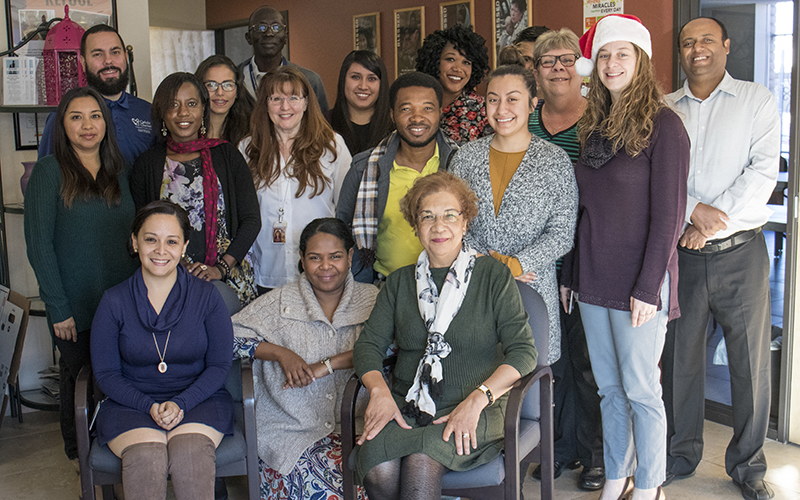- Slug: BC-CNS-Fostered Refugees,740
- Photo available (thumbnail, caption below)
EDS: A previous version of this story reported an incorrect number of foster families in the state in the fifth graf. The 21 foster families cited are those only working with Catholic Charities of Arizona. The story below has been corrected, but clients who used previous versions of the story are asked to run the correction that can be found here.
By NICOLE TYAU
Cronkite News
PHOENIX – They are mostly young boys, orphaned by war and conflict in their home countries who arrive in Arizona with little more than family photographs or maybe spices for their favorite foods.
Most of these refugee children are from Afghanistan, the Democratic Republic of Congo and Somalia, and are in need of a foster family to help them. Phoenix is one of 12 U.S. cities that accept refugee children under the Unaccompanied Refugee Minors Program.
Even before arriving in Arizona, many refugee children have spent months in refugee camps overseas while being screened for permission to come to America. But there are not always enough families to help them.
“There is not sufficient capacity to help all the kids who need it,” said Katie Kuennen, associate director of children’s services for the United States Conference of Catholic Bishops.
Catholic Charities of Arizona is one of the agencies tasked with finding foster families. Clairette Clinger, director of the Catholic Charities’ Unaccompanied Refugee Minor program, said President Donald Trump’s efforts to impose refugee travel bans have hampered efforts to recruit foster parents. The agency has 21 foster families licensed to care for refugee children.
“You have this type of sentiment that foster children are always going to be in trouble,” Clinger said. “But they’re not. It’s a child in need of a home.”
On Oct. 24, Trump announced a change to the refugee ban. However, refugees still could be denied entry to the United States in the future.
The lift comes with a caveat that refugees will be subjected to stricter screenings. Administration officials have said that 11 countries, which remain unidentified, will still be reviewed. Officials added that refugees from those countries could be admitted on a case-by-case basis if they are not a threat to the United States.
“We’ve seen, especially now with the travel ban in place, that this is impacting refugee children,” Kuennen said.
Although a backlog of cases and the scarcity of foster families have been problems in the past, travel restrictions are delaying or may delay already-placed children from arriving in the United States. Children and teens go through the same security screenings as adults and families.
If they are accepted as refugees, the United Nations gives the U.S. State Department a list of approved refugee minors. The U.S. Bureau of Population, Refugees and Migration distributes that list to United States Conference of Catholic Bishops and Lutheran Immigration and Refugee Service.
In the time it takes to approve refugee minors for travel, organizations like Catholic Charities work to find the foster homes. Clinger said the right home is a combination of space and cultural sensitivity.
“They come from out of the country and we don’t know anything except for whatever’s on their paper,” Clinger said of the refugees. “Within a month or six months, we can determine if the child needs a higher level of care.”
For foster families to be eligible for refugee child placement, they must undergo extensive training from social service workers, according to the Office of Refugee Resettlement. Licensed families have to complete 33 hours of training classes, which can take up to eight months, Clinger said.
However, the Arizona Office of Licensing and Regulation is implementing online classes for all potential foster families in January 2018, which Clinger hopes will increase the number of eligible homes for refugees.
“It’s very difficult for (refugee children) during the first year for their adjustment,” Clinger said. “We have to make sure the parents have the tools and have the cultural ability to have the children.”
Catholic Charities provides extra training so that families understand the politics and customs of the refugee child’s home country, while giving them better ways to deal with the trauma of death and war.
“We know most of their weaknesses and their strengths, and we also know their competency as far as diversity is concerned,” Clinger said. “This is a thing you’re not born with, the acceptance of diverse cultures.”
Even if the refugees have a family willing to foster them in the United States, they enter a country that has been opposed to accepting refugees in the past. In October 2016, the Washington-based Pew Research Center reported that 54 percent of Americans said the U.S. has no obligation to take in refugees.
^__=
The Catholic Charities team works to place refugee children in foster homes. (Nicole Tyau/Cronkite News)
Some of the earliest refugee children in Arizona were young men fleeing the Sudan. Their photos sit on a bookshelf in the Catholic Charities office. (Nicole Tyau/Cronkite News)

